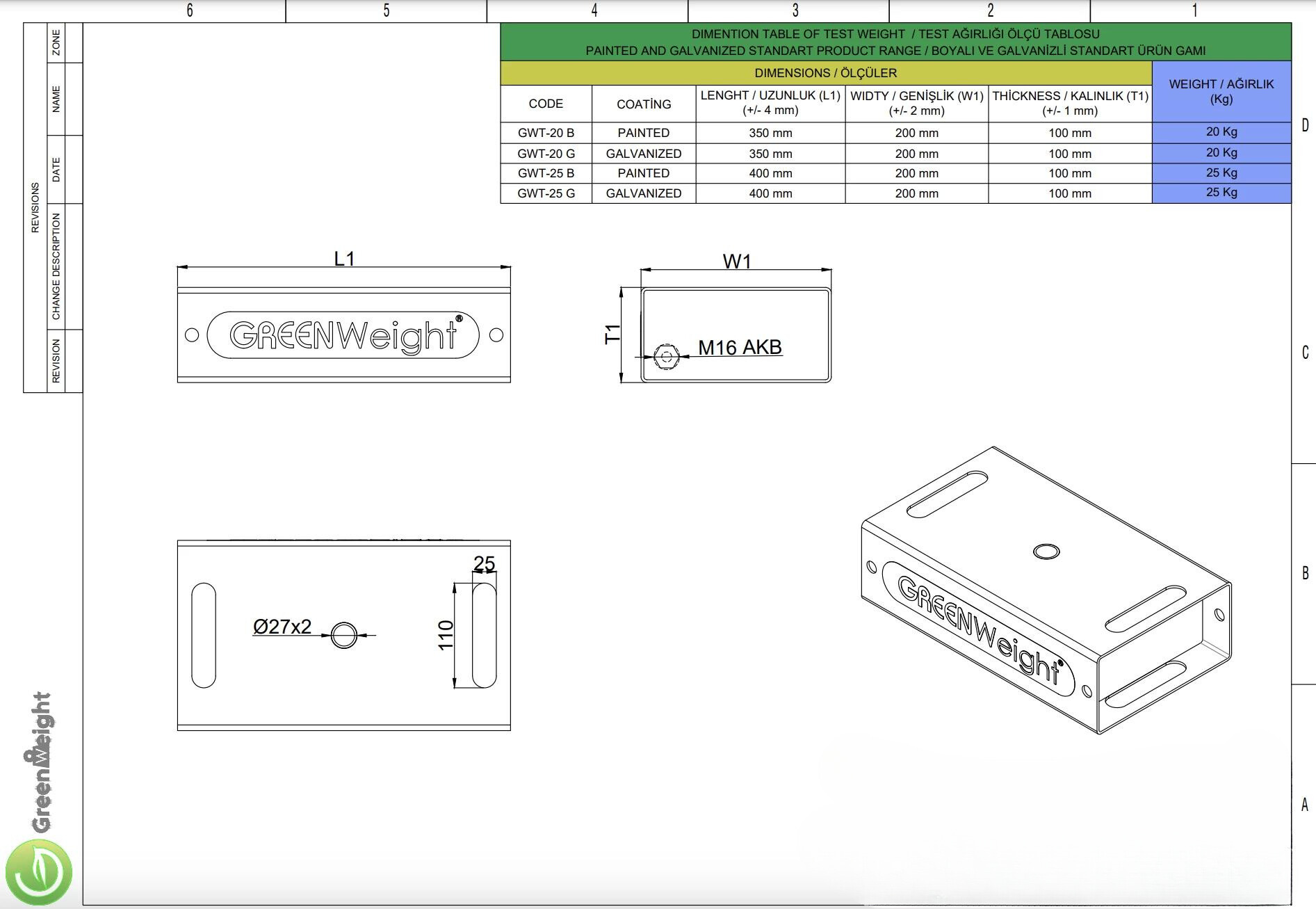Elevator test weights play a pivotal role in evaluating the safety and robustness of elevators.
Why Should You Choose Greenweight Elevator Test Weights?
Greenweight is a prominent brand in the field of elevator test weights. Supported by over 50 years of experience and innovative technologies from Ergin Makine, Greenweight products stand out with durability and environmentally friendly features. Thanks to its patented technology, it provides 5-6.5 times less CO2 emissions compared to traditional production methods. The company, embracing customer satisfaction and trust, continues its vision of being a regional leader under the Greenweight brand. Greenweight, prioritizing safety with eco-friendly and high-quality test weights, continues to stand out as a preferred brand.
Get a QuoteImportance of Greenweight Elevator Test Weights
Greenweight plays a crucial role in determining the safety and performance of elevators through its elevator test weights. These specialized test weights contribute to obtaining reliable and effective results in elevator loading tests. Greenweight products, manufactured by Ergin Makine, demonstrate successful performance, especially in evaluating the maximum load capacity and safety systems during elevator loading tests.
These tests are important for ensuring the safe and smooth operation of elevators. Greenweight elevator test weights, by assisting in the successful execution of these critical tests, play a significant role in testing whether elevators pose any risks to human safety.
Therefore, opting for Greenweight elevator test weights is a reliable choice for building owners and managers to ensure the safe and effective operation of elevators.

Fill Out the Form Now, We will Send an Offer
Frequently Asked Questions
What is the importance of elevator weight testing?
The testing of elevator weight is essential for assessing the maximum load capacity, speed, and safety features of elevators. This examination is critical for verifying the proper functioning of safety systems and ensuring the dependable performance of elevators.
What are the key components of elevator weight testing?
Elevator weight testing is a process that assesses the maximum weight capacity of an elevator. The main components include test weights, brake systems, emergency systems, and speed control systems.
What are test weights and how are they used in elevator tests?
Test weights are specially designed weights used in elevator loading tests. These weights are employed to assess the elevator’s maximum load capacity and test its safety features.
What are the signs indicating the need for elevator maintenance?
Signs that indicate the need for elevator maintenance include abnormal sounds, slow movement, irregular stops, and erratic door movements. Additionally, errors displayed on elevator buttons or screens may also signal a need for maintenance.
How often should equipment be inspected?
The frequency of elevator inspections is determined by the type of equipment, with standard inspections usually occurring annually. Nevertheless, under special circumstances or specific conditions, more frequent inspections may be required.
Why should I prefer Greenweight test weights?
Greenweight elevator test weights stand out for their environmentally friendly and durable features. With patented technology, they contribute to low CO2 emissions and provide reliable performance in elevator weight tests. In summary, Greenweight products offer reliable performance, eco-friendly technology, and patented design advantages, specifically developed to enhance elevator safety and performance.
What is the impact of test weights on elevator safety?
Test weights, used during elevator weight tests, assess the proper functioning of safety systems. This is crucial for ensuring the reliable operation of elevators.
What are Elevator Test Weights?
Elevator test weights are specialized weights used to evaluate the performance of elevator systems. These tests are conducted to determine the maximum load capacity, safety, and overall performance of elevators. Test weights assess how elevators respond under specific load conditions, helping to ascertain whether elevators operate safely and effectively.
What are Elevator Test Weights Used For?
Elevator test weights are specially designed weights used to assess the performance of elevators under specific weight conditions. These tests, particularly simulating scenarios exceeding the maximum load capacity of elevators, play a crucial role in determining how elevators respond in emergencies or when carrying heavy loads, thereby assessing the safety and effectiveness of elevators.
The weights used in these crucial tests are applied to assess vital elements like carrying capacity and braking systems, ensuring their correct operation, and enhancing the overall integrity and safety of elevator systems. This assessment allows for the implementation of necessary measures to guarantee the secure and seamless functioning of elevators.
How Often Should Elevator Weight Tests Be Performed?
Elevator systems should undergo regular inspections to ensure compliance with general safety standards. Annual comprehensive elevator inspections involve obtaining a certificate confirming adherence to specific rules. However, periodic full-weight tests are also necessary to ensure elevator safety. These tests are typically conducted every 5 years, assessing the maximum load capacity, safety, and performance of elevators. The frequency of weight tests may vary based on factors such as elevator type, capacity, usage patterns, and local regulations. For instance, elevators in frequently used buildings should undergo a weight test every 5 to 7 years, while those in medium-traffic buildings may require testing every 3 to 5 years.
What Happens If Elevators Are Not Tested?
If elevators do not undergo regular testing and maintenance, they can become non-functional. Many people who rely on elevators in their daily lives may face a situation where this negligence can lead to serious dangers. Postponing routine tests and maintenance can result in the deterioration of elevators over time, leading to more significant problems. Therefore, regular testing and maintenance are crucial not only for ensuring safety but also for preventing long-term issues.

